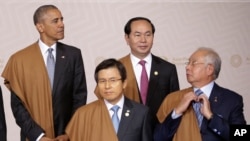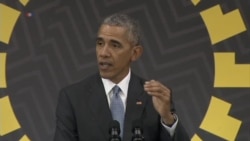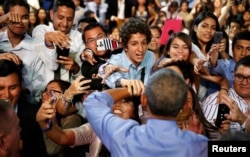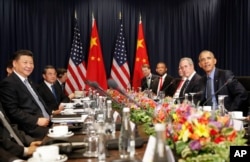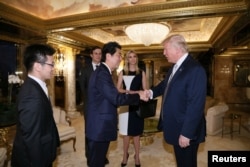Leaders of 21 Asia-Pacific nations have ended their annual summit with a call to resist protectionism and protect the Trans-Pacific Partnership (TPP) trade pact, which has been thrown into uncertainty after the election of Donald Trump as U.S. president.
The Asia Pacific Economic Cooperation forum closed Sunday in Lima, Peru, with a joint pledge to work toward a sweeping new free trade agreement that would include all 21 members as a path to "sustainable, balanced and inclusive growth,'' despite the political climate.
Trump strongly criticized the TPP -- which includes the United States but not China -- during an election campaign notable for his strong criticism of U.S. free trade deals.
But at a news conference at the end of the summit, U.S. President Barack Obama said the United States should not retreat from global trade, but should seek to "do trade right'' so that workers are protected and environmental standards are upheld.
Obama said it's time for the U.S. to reaffirm its support for the TPP trade deal. He said if Trump withdraws the U.S. from the pact, it will be a weaker deal and the U.S. would lose an opportunity to shape the rules of global trade "in a way that reflects our values."
Earlier in the day, Obama and Russian President Vladimir Putin had brief talks about Syria and Ukraine on the sidelines of the APEC summit in Lima, Peru, the White House said, in their first face-to-face encounter since the election victory of Donald Trump.
Obama later told reporters he encouraged Putin to uphold Russia's commitments under the Minsk deal aimed at ending the Ukraine conflict. Both the White House and the Kremlin said the leaders agreed that U.S. Secretary of State John Kerry and Russian Foreign Minister Sergei Lavrov should keep working on initiatives to decrease the violence in Syria and alleviate suffering.
Putin, speaking later in Lima, said he and Obama noted that while their working relationship had been difficult, they'd "always respected each other's positions, and each other."
The Russian leader also said Trump has confirmed to him he is willing to mend ties.
"The president-elect confirmed he is willing to normalize Russian-American relations. I told him the same. We did not discuss where and when we would meet."
Barring unforeseen circumstances, this is the 52nd and final foreign trip of Obama’s eight years in the White House.
A cornerstone of Obama’s foreign policy was a focus on Asia and the Pacific, the so-called Asia-Pacific re-balance, but that could change substantially after he leaves office in nine weeks.
On Saturday, Obama had a message Saturday for 1,000 young leaders from all over Latin America and the Caribbean on President-elect Trump: "Don't assume the worst."
Speaking at a town-hall style meeting in Peru's capital, Obama took several questions from young people in the audience who were anxious about the future as the U.S. presidency changes hands.
Obama called on them to be optimistic, advising that no one can make things better unless they have hope.
"I think it will be important for everybody around the world to not make immediate judgments, but give this new president-elect a chance to put [his] team together, to examine the issues, to determine what their policies will be," Obama said.
"How you campaign is not always how you govern," he added.
The president appeared to be in his element interacting with young people in Peru Saturday, in a meeting similar to many other town-hall gatherings he has taken part in during previous trips across Asia, Europe and Africa.
Obama received a rock star's welcome from the crowd, and he sought to reassure everyone in his youthful audience, part of the Young Leaders of America initiative, that they can write their own history. Although his time as president is coming to an end, Obama said, the worldwide network of encouraging entrepreneurship among young people is just beginning: "The main message I want you to know is that you have a partner in me, and you have a partner in the U.S. government."
After the town hall, Obama held a bilateral meeting with Chinese President Xi Jinping. In brief remarks to reporters beforehand, Xi expressed concern.
"We meet at a hinge moment in the China-U.S. relationship. I hope the two sides will work together to focus on cooperation, manage our differences and make sure there is a smooth transition in the relationship, and that it will continue to grow going forward," Xi said.
After the two leaders met, the White House released a statement saying: "The two leaders reflected on the significant progress they have achieved in strengthening the bilateral relationship through sustained engagement."
U.S. officials said Obama and Xi addressed the threat presented by North Korea's efforts to advance its nuclear weapons and ballistic missile systems and affirmed their firm commitment to achieving denuclearization of the Korean Peninsula.
The Chinese and American presidents also pointed to the recent Paris Agreement to combat climate change as an example of their two countries' progress, and its benefits to the international community.
European and Asian leaders have expressed concern about President-elect Trump's skeptical statements about climate-change efforts, international trade agreements and international security alliances.
Latin American leaders including Peruvian President Pedro Pablo Kuczynski also say they are concerned about Trump's avowed plan to act quickly and firmly to close U.S. borders to all Latino immigrants trying to enter the United States with inadequate documentation.
Obama has sought to reassure foreign leaders about America's commitment to bedrock democratic principles and alliances, pointing to his public comments throughout his current trip abroad, which began in Greece and Germany before bringing him to Peru.
Trump met with Japanese Prime Minister Shinzo Abe in New York on Thursday, after Obama already had left Washington for Europe. Abe said afterward that he thought Trump was a "trustworthy leader."
Trump posted on his Facebook page, "It was a pleasure to have Prime Minister Shinzo Abe stop by my home and begin a great friendship."
Earlier Saturday, Obama met with Peru's president and with leaders of the Trans-Pacific Partnership countries. He tried to highlight a mutual commitment to free trade and to creating good jobs, but Obama has had to concede that the U.S. Congress will not take up the TPP issue now that Trump has been elected.
The president told the young people at his town hall meeting he does not anticipate the new administration will make major change in U.S. economic policy toward Latin America. However, he warned: "There are going to be tensions that are going to rise, probably around trade more than anything else."




